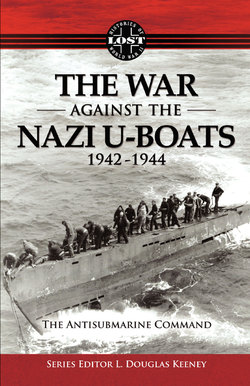The War Against The Nazi U-Boats 1942 – 1944

Реклама. ООО «ЛитРес», ИНН: 7719571260.
Оглавление
L. Douglas Keeney. The War Against The Nazi U-Boats 1942 – 1944
The War Against The Nazi U-Boats 1942 – 1944. The Antisubmarine Command. L. Douglas Keeney
Foreword
The Background
The Antisubmarine Controversy
The Battle of the Atlantic
Operations in the Eastern Atlantic
The Moroccan Sea Frontier
Operations in the Western Atlantic
The Caribbean and South Atlantic Areas
The North Atlantic Convoy Route
Antisubmarine Tactics and Attack Narratives
Summary and Results of AAF Antisubmarine Command Operations
Problems of Logistics, Research Coordination, and Training
Conclusion
Отрывок из книги
The clouds of World War II were casting long and increasingly dark shadows across the face of America. By 1942, with the exception of neutral countries such as Spain, Switzerland and Sweden, the continent of Europe had been overrun by the Germans with just Britain and Russia holding them back from compete domination. On the other side of the world, Imperial Japan had a pincer-like grip on the remainder of the nations with occupation forces stretching from the Aleutians to New Guinea leaving just a narrow sea lane to Australia, which was also in jeopardy. If Japan were to prevail in the East and Germany in the West, North America would be an isolated continent surrounded by hostile nations on both sides.
“In October 1942, the US Army Air Forces entered the Atlantic war by creating several land-based antisubmarine squadrons. Officially known as the US Army Air Forces’ Antisubmarine Command, these units were designed to help the US Navy hunt for enemy submarines, which, at the time, were patrolling along the Atlantic coast and in the Caribbean.
.....
The trouble was obvious. A multiplicity of headquarters would have slowed up the functioning of any dependent organization. It was all the more serious in its effects on antisubmarine operations which depended above all else on rapid coordination and extreme nobility. The division of the sea frontiers into districts and subdistricts had been enough of a handicap especially in view of the habit of thinking in terms of rigid boundaries or “chop lines” which seemed to be an ingrained part of the naval administrative mind. Yet local arrangement had been made to mitigate this handicap. Army air units were apparently not attached to district naval commanders, a practice which, if adopted, would have ruined the effectiveness of the Army antisubmarine forces. The real trouble came when aircraft were required in other sea frontiers, all of which were under COMMINCH, but without liaison or means of rapid inter-communication. Yet the antisubmarine campaign depended on the ability of air striking units to fellow the submarines wherever they might go and to change stations rapidly.
Unity of command, then, became the first prerequisite for improved operations. The antisubmarine campaign needed other things: better equipment, a better training program, a better communication system, and an organization devoted completely to the task of hunting U-boats, unimpeded by competing claims on its services. Above all, it required mobility of forces. But all these needs were subordinate to, and in one way or another dependent upon, the attaining of unity of command.
.....